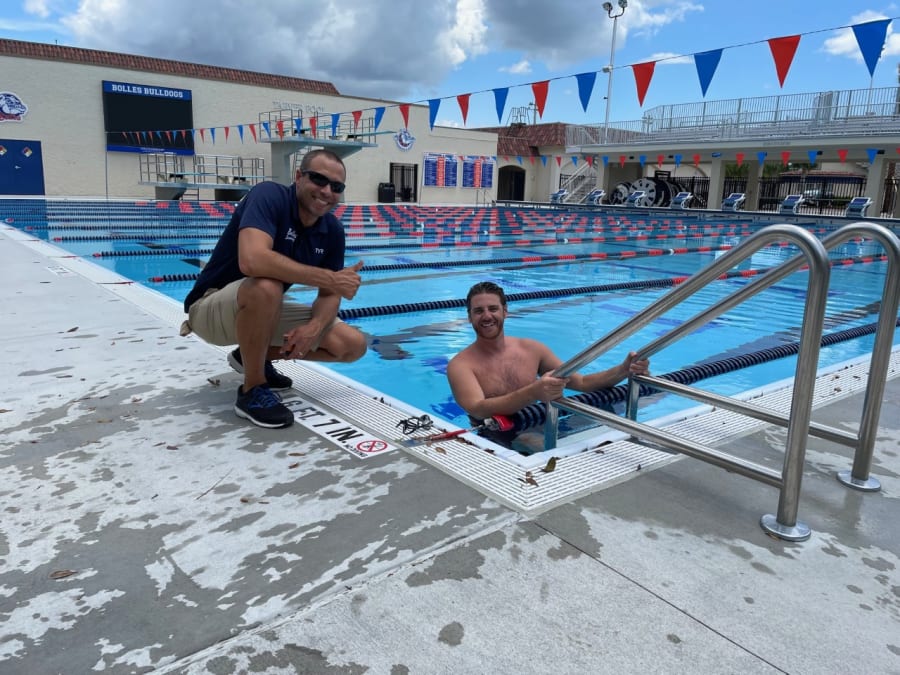JACKSONVILLE, Fla. – It’s one of the most-watched sports in the Olympic games: swimming. And some of the biggest names in Tokyo aren’t just American swimmers, they’re swimmers from the Jacksonville area.
Caeleb Dressel of Green Cove Springs and Ryan Murphy of Ponte Vedra Beach came into Tokyo with gold medals, and Dressel has already claimed two more, including his first individual gold in the 100-meter freestyle. Murphy took bronze in the 100-meter backstroke.
Chances are both will return home with much more hardware.
Besides muscles, drive and fame, the two have something else in common: they trained together on the Bolles School Sharks club swim team in Jacksonville.
So what’s in the water at The Bolles School pool? I went to Bolles to figure it out, and maybe try to earn some talent.
When you arrive at the athletic complex, a not-so-subtle wall show’s the school’s Olympic history.
More than 60 of the world’s best Olympians either attended or trained at the prestigious (and pricey) private school. That includes more than swimming, although we’ll focus on that for the purpose of this story.
“The water here is filled with great people when we have practice. That’s the secret right now,” said head aquatics coach Peter Verhoef, who quickly knocked down my theories that the pool water was filled with super vitamins or extraterrestrial powers.
There’s no doubt the school, and Verhoef, have trained Olympians.
“I’ve gotten to coach some Olympians in the past,” said a humble Verhoef, who swam competitively for the University of Georgia.
This year, for the 2020 Olympics (happening in 2021) several swimmers with Bolles ties are competing in Tokyo. They represent more than just Team USA:
- Ryan Murphy class of ’13 (USA)
- Caeleb Dressel (former Sharks club member/USA)
- Joseph Schooling class of ’14 (Singapore)
- Santo Condorelli class of ’13 (Italy)
- McKenna DeBever (former Sharks club member/Peru)
“When you look at these Olympic athletes, they have an incredible attention to detail,” Verhoef explained. “Caeleb Dressel came out of here, probably the best attention to detail of anyone you’ll ever talk to. He knows down to a stroke, down to kick what could have been better.”
Speaking of “could have been better,” I had a coach critiquing my form. I’m a lifelong “casual” swimmer who made a couple of bucks lifeguarding in high school. I have never, however, competed in anything beyond a pool party and certainly haven’t studied hydrodynamics.
So here’s what I learned in my crash course: It starts with a fast beginning off the wall. That’s huge. Calculated breathing is key for longevity. And strong propulsion, kicking, keeps your body moving fast.
“Head, hips and heels on the surface,” Verfhoef said as I pushed down the pool lane. “Keep that kick going.”

While you’ve got to have muscles, mental strength is just as important.
“Absolutely, it’s a lot more than just muscle,” Verhoef said. “But muscle is a huge part of it. The beautiful thing for swimming is it is everything. It’s your person, it’s your mindset, it’s your mental ability to handle pressure and to push yourself.”
The best athletes practice daily, eat a lot of food but are relatively “clean” and (unlucky for me and probably you) start early in life.
“Pretty much any Olympian that you see has probably been swimming their whole life,” coach said. Competitively, I might add.
As for me, I’m still with the tadpoles.
“That looks a lot better than where we started,” he said. “I’ll take that. Cleaning up.”
The 2024 Summer Olympics are in Paris. It’s more likely I’ll be reporting there than competing.
And when it comes to Olympic swimming, the actual sport isn’t the only thing that takes a lot of skill. My colleague Lena Pring tried out a tight Olympic swimsuit. Check out the results below:

